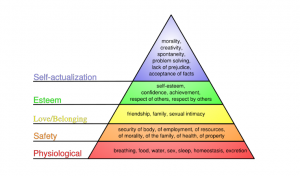Making a successful career
You may have come across the works of Abraham Maslow in your humanities, sociology and arts-based classes at high school or university. His theories about the hierarchy of needs for people have generally stood the test of time. This is especially true in the workplace.
Organisational psychology has benefitted enormously from understanding Maslow’s hierarchy of needs on a deep level. And it can help you as an individual navigating your own career as well as gaining insight into a primary tool often used by human resources and management.
Want a guidebook to help you create a successful career based on motivation? Let’s look at the work of Abraham Maslow
Self-actualisation as the pinnacle
We all know that our needs grow and expand as our capability to meet our needs grows. For example, once we have shelter, warmth, food, companionship and safety met, we expand on these ideas. We may move from basic shelter to wanting our own. This may move through share-housing, solo renting, partner renting through to ownership. Food may move from basic needs met all the way through to gourmet cooking and fine dining. Safety progresses from general safety through to safety for the future across a wide variety of topics. We may move away from abuse to healthy interactions.
Any aspect you can think of matures onto another level as our capability increases.
This is true of our working lives as well.
We study, apply that study to work experience, study some more, start as a junior and then grow in capability throughout our career. Our job begins to meet basic needs and moves through to belonging in a field or workplace as part of our identity. It builds our esteem as we become known as an employee, achieve milestones and carve out a name for ourselves in our industry. This moves further into our self-actualisation as the things we pride ourselves on. We internalise each step of the process to grow not only in capability but also confidence.
Our relationship with work is about seeking satisfaction and that self-actualisation. Being able to tap into that sense of self and meet the requirements within means we can self-motivate and be motivated by savvy managers.
More than an end game
You cannot motivate yourself successfully with only the summit of the pyramid in mind. There must be some short and medium-term growth to help you keep keen and clear as you move towards your goals.
Take another look at the pyramid and you can see there are the baby steps within.

Physiological Needs –Air, food, drink, shelter, sleep
Think about your workplace. If the place is dirty, cluttered, leaky and even too open-plan to do great work, things will suffer.
Similarly, if you have a workplace that allows proper rest, values work product over presenteeism and is proactive about providing nutrition, space and reasonable hours, you will continue to meet the challenge set down in front of you.
Therefore, its important to rest, exercise, eat proper foods and not buy into the myth that many hours at the desk makes for a successful career. You can motivate yourself and others through making self-care a priority.
Safety Needs –Protection from elements, security, order, law, stability, freedom from fear
Working in a workplace where everyone jumps at the footfalls of a manager and/or where practices are not lawful is a recipe for a bad working environment. It also doesn’t bring out the best in people.
But you don’t have to be working with a bully, in a toxic workplace or using questionable practises to feel as though your safety is endangered.
Inconsistency with management and unpredictable behaviour can also create concerns about stability and safety. Not having practises appropriately outlined, having no clear schedule or having to deal with changeable moods and regulations can all foster doubt in worker safety.
Here, it’s important to look for ways to reduce decision fatigue and remove inconsistency where possible. For both yourself and for the others around you.
Look for the reliable over the changeable. Seek routine and foster a baseline that can be counted on.
Love and Belonging Needs –Friendship, intimacy, affection and love, – from work group, family, friends, romantic relationships
No man or woman is an island. We all need community, connectivity and a sense of belonging. Sometimes, work and the connectivity can replace the breakdown in a family relationship. Other times, the impact of poor working relationships on your family can be devastating.
Whether you find true belonging inside your workplace or not, you should seek relationships that help to make you feel appreciated and loved in the wider world.
Teamwork, having a mentor or business coach, taking advantage of professional organisations, participating in alumni events, fostering social inclusion at work, finding networking events or online communities- all these things can help give you the fuel for the long career haul.
Esteem Needs –Achievement, mastery, independence, status, dominance, prestige, self-respect, respect from others
Imagine a workplace where your work is recognised in full. Where people enjoy your contributions and make you feel a part of a team- or a movement- towards industry success.
Sadly, for many people, the opposite is true. We’re often so flat out with our little corner of the working tapestry that we don’t have the time or ability to stop and review the situations of others.
There are a couple of ways to tap into your esteem needs outside of an unappreciative or ignorant workplace.
Think about how you can build your own position of authority. This might be through an insightful LinkedIn profile, a website or blog, social media and/or joining the speaker route. You may also take on the mantle of supplying what is missing in your workplace. By actively promoting the achievements of others, you can also foster a community that in turn sees the good work you do.
Be the change you want to see on the floor, in the workplace and across the industry. By leading the charge, you can find a whole lot of love out there.
And remember to internalise your own successes and take the time out to count them. Celebrate them. Mark them as a special moment. Have a DONE list that shows you what you have completed just as much as what is to do be done.
Self-Actualization Needs –Realizing personal potential, self-fulfilment, seeking personal growth and peak experiences
Here is true ownership. It’s about you making the most of your skills, successes and career. It’s about taking those quiet moments to ring your bell and show your purpose.
The small grains of salt with Maslow
While Maslow truly opens the door to seeking a way to motivate staff, it wouldn’t be science if there wasn’t a small pocket of caveats that need to be considered.
Maslow’s hierarchy of needs generally didn’t cater to 3 key areas:
The assumptions on childhood
Maslow does assume in his works that most people come from a functioning baseline from their childhood and this sets them up well for adulthood. In the places where dysfunction may be a feature, Maslow assumed that the adult wouldn’t perform well in a working setting. We now know this to be untrue. While significant difficulty during childhood can create issues with learning and career outcomes, it is not a set conclusion. And many people have proven you can create a viable and prosperous career even if the childhood is lacking.
Diversity of thought
Maslow also tends to lean on non-diverse archetypes. That is, performance from people on one level across to the next are viewed as standard. Anyone that has ever worked in a workplace knows that not all workers share the same level of articulation, diligence and desire to perform. The motivation can be fostered, but it does need to be tailored to suit.
Our desire for credit over criticism
Credit is something that employees relish in accepting responsibility for. Criticism and even feedback have less of the path beaten to it’s door by eager employees. This creates some tension around accurately measuring satisfaction in a needs-based model. It’s true that some people find it easier to take their lumps than others. This in turn influences the process.
However, even though these points have weight to them, they are more a miscalculation of some elements rather than a reason to abandon the theory.
Applying Maslow to your career path
This is but a glimpse of how Maslow’s hierarchy of needs can be applied on an organisational and personal level to further your professional career. If you want to understand where your working needs lie and how to create potential through nurturing yourself, get in touch. I am more than happy to help you identify how you can use Maslow and your inert needs to their best advantage.





